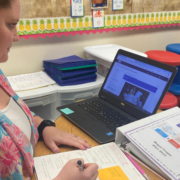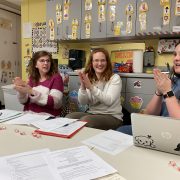Davie County Schools One of Three Districts Selected to Living LETRS Panel

By Jeanna Baxter White
Davie County Schools was one of only three districts selected to a panel for Language Essentials for Teachers of Reading and Spelling (LETRS) training in NC. The Office of Early Learning (NCDPI) and three school districts came together virtually to present experiences with LETRS. Other districts on the panel included Columbus County and Union County.
As part of this panel, teachers Megan Cooper and Leigh Ann Davis, and Renee Hennings-Gonzalez, an instructional coach for the district, shared best practices and successes of LETRS training for DCS teachers and staff. At one point, nearly 600 people had joined the virtual session. LETRS, which is being used statewide, takes research on how children learn to read and creates teaching strategies for elementary educators.
LETRS is a component of legislation passed in April 2021 mandating that literacy instruction be based on a body of research called the science of reading. The goal is to ensure that children develop the skills and techniques needed to become successful readers through proven, evidence-based practices.
Decades of research on literacy instruction have revealed how the brain learns to read and the instructional methods that support this process. Learning to read is incredibly complex, so teaching reading requires a deep understanding of the science behind how we learn to read, why we spell the way we do, and how phonemic awareness and phonics lead to comprehension.
LETRS® Training, developed by Dr. Louisa Moats and Dr. Carol Tolman, was designed to strengthen teachers’ knowledge of language structure, the development of the reading brain, and how to nurture the development of foundational literacy skills such as decoding and language comprehension.
It’s an intensive program involving 160 hours over two years of learning about the brain and the building blocks of language. And it was rolled out while teachers were already focused on balancing the demands of catching children up academically following remote learning, navigating shifting COVID protocols, tracking missing students, and paying close attention to the kids’ mental state, while also finding time to wipe down surfaces and help with mask fitting.
Davie County Schools began LETRS last August as part of the second cohort. (Full statewide implementation isn’t expected until the 2024-2025 school year.)
Strong support from the district and prior training about the Science of Reading through DavieLEADS (Literacy Empowers All in Davie to Succeed) paved the way for Davie County’s successful implementation of LETRS training. Implemented during 2017-2018, DavieLEADS is an early learning and literacy initiative funded by a five-year, $2.5 million grant from the Mebane Foundation to increase kindergarten readiness and to increase the percentage of students reading proficiently by the end of third grade through building capacity in staff, strengthening instructional strategies, and updating materials aligned with state standards K-3.
Hennings-Gonzalez explained that over the course of the DavieLEADS grant, teachers have received training, resources, coaching, and support in concepts based on the Science of Reading research. Components of programs and instruction such as Heggerty, Letterland, and decodable small flexible group reading lessons have addressed Science of Reading research.

“The training we received through DavieLEADS has definitely been helpful and opened the door to the LETRS training,” agreed Cooper, a first-grade teacher at Shady Grove Elementary. She shared that teachers received both Reading Research to Classroom Practice and decodable lesson plan training before the LETRS training mandate. “I feel that DavieLEADS, along with our curriculum department, have prepared Davie County teachers and helped us keep up with the ever-changing requirements for the research behind reading.”
During the panel, Cooper and Davis offered encouragement and tips on carving out time to complete the lessons.
Cooper detailed how she sets time aside each week to work on the different assignments. Preferring to work in smaller sessions rather than sitting down and doing it all on workdays, she takes 30-45 minutes twice a week after school to work on lessons and utilizes her duty-free lunch period and some of her planning time to work on LETRS. “I know teachers don’t want to give up their planning time but once they realize that they can use this program within their lessons and to benefit their interventional instruction, it becomes a natural process to reference the LETRS program when looking at what students need.”
She schedules check-in meetings with her instructional coach and each grade level discusses LETRS once a month during PLCs. As an added help, the district curriculum department created a pacing guide for the units to help teachers ensure they have them completed, and the district provided optional workdays and a half-day with a paid sub for teachers to work on LETRS. “Davie County has truly supported its teachers and given us the time to work on this crucial program.”
Davis, a 4th-grade teacher at Pinebrook Elementary, agreed that while time-consuming, the training is worth it. “The information I have learned through LETRS has been interesting and has given me insight into the reasons why students can struggle in reading. There are many different components of the reading process and the students’ needs are diverse.”

“It has been helpful to recognize some of the reasons why some kids struggle with reading. By the time students reach 4th grade, it often appears that reading trouble is in comprehension. LETRS has reiterated to me that what may appear to be a comprehension difficulty might truly be a phonemic or phonological awareness issue. LETRS has made me more confident in our school’s decision to include programs to support these areas of weakness in the upper elementary grades. We noticed that some students needed more instruction in these two areas, and included intervention programs such as Letterland, HillRAP, and Sonday. It has been encouraging to see students grow in their reading because of the interventions we have put in place.”
Hennings-Gonzalez summed it up this way, “Moving ahead, LETRS will help deepen teachers’ understanding of best practices to support students’ reading, spelling, writing, and comprehension needs. DavieLEADS provided teachers with the resources needed to reach students as readers, while LETRS will continue to build teachers’ knowledge base on the “why” and research behind the use of programs, curriculum, and best practices in reading instruction.”






Leave a Reply
Want to join the discussion?Feel free to contribute!